
The/Nudge Institute
View Brand PublisherSpotlight:The/Nudge Incubator: Nudging problem solvers working on India’s most critical livelihood challenges
Cohort 9 of The/Nudge Incubator comprises early-stage startups solving for resilient livelihoods.
Any institution trying to improve the well being of underprivileged people must approach it through the lens of livelihoods. Making breakthrough progress in areas that pose the biggest hurdle is the key.
But, the problem lies in practice. Livelihood issues are a lot more complex than what meets the eye. Unforeseen factors often affect communities and problems cannot be handled without adequate policy, technology, and market support. Incubatees of Cohort 9 of The/Nudge Incubator are working on India’s most critical livelihood challenges and aiming to create impact at scale.
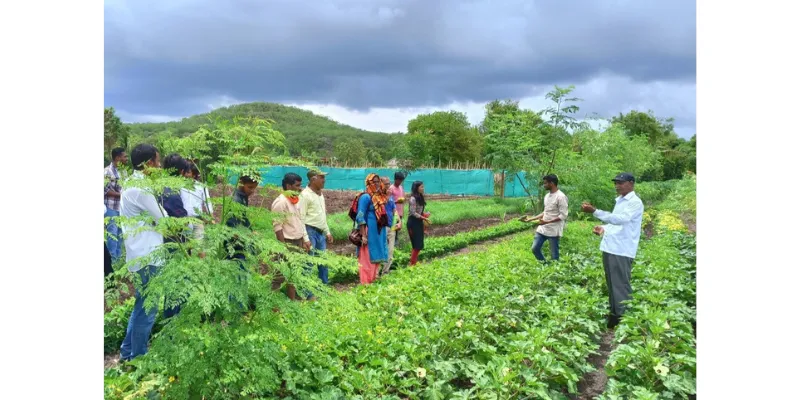
Siddesh Sakore, Co-founder Agro Rangers with farmers at their demonstration plot near Pune
Focus on disadvantaged communities
Agriculture is highly vulnerable to climate change and soil degradation is drastically reducing farm productivity.
Lived experience in a farming community motivated Siddhesh Sakore, Co-founder, Agro Rangers to pursue research on harmful chemical farming practices that cause soil degradation and further contribute to climate change — the two main reasons for depleting farmers' income, increasing migration of farmers, and destroying the livelihoods of small and marginal farmers.
Agro Rangers is committed to the adoption of regenerative organic farming practices in India’s agricultural sector. Based in the drought prone regions of Pune, the organisation focuses on rejuvenating marginal and small landholder farmers’ lands through regenerative organic farming methodology including agroforestry.
Siddhesh believes that soil is the most exciting factor as it has the potential to mitigate climate change and improve livelihoods. Agro Rangers’ model has already helped over 50 farmers switch to environment-friendly farming practices.
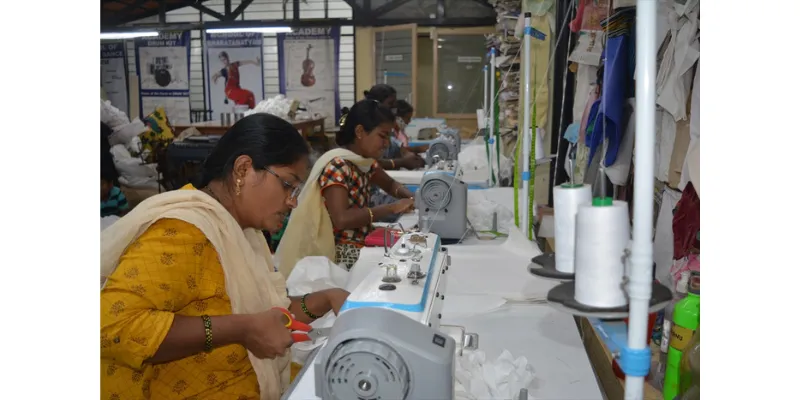
Women working in a Srujna centre
Another segment of society that is highly disadvantaged is women from low-income groups. Keeping this in mind, Vaishali and Jyotika, founders of Srujna created a model wherein they provide employment opportunities to women from such backgrounds. The duo’s passion as MBA students turned into a project when Jyotika interned with a shelter home that worked to rescue victims of human trafficking. The conversations with women who had nothing but were still trying to rebuild their lives with no support from family and friends, got them thinking. They implemented a pilot project engaging 30 survivors of human trafficking by enabling them to make jewellery products and facilitating the sale in exhibitions.
This project became the brainchild for Srujna, an organisation that empowers women to take control of their lives and empower the people around them. Srujna has helped more than 5,000 women by ensuring self-employment opportunities, market access, and skill training.
Fixing the broken promise of fair wage
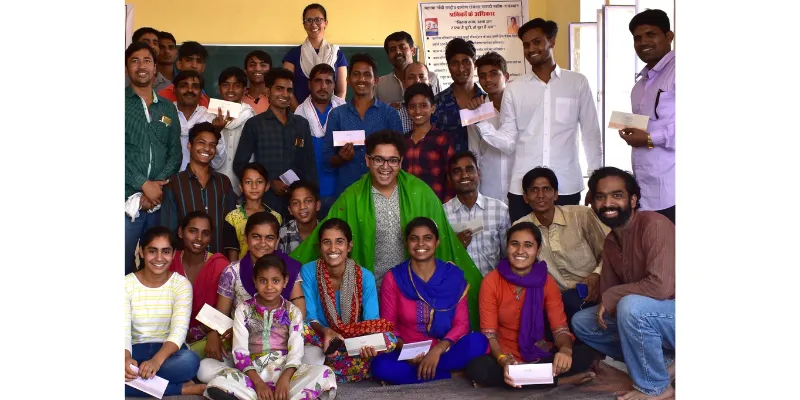
Manu, Co-founder Karya with rural youth
Marginalised and often forgotten is the issue of daily wage workers and fair wage. Workers continue to live in exploitative and marginalised conditions, where employers and the state infringe upon their constitutional right to a fair wage. A chance meeting in 2017 at Microsoft Research India’s Technology for Emerging Markets research group led Vivek Seshadri and Manu Chopra, founders of Karya to leverage technology to solve this particular issue.
While trying to buy high-quality Indian language speech data to train their AI models, they noticed a glaring disparity. Datasets were being sold at 100-200 times the cost of collecting the data. And most data workers in India made less than $1 per hour.
This brought up the question — what if data collection tasks could be a source of fair wages for India’s under employed and economically disadvantaged groups?
Over the next four years, Manu and Vivek conducted research on the viability of producing ethical datasets that offer fair compensation and dignified workplaces. Their findings indicated the potential for using crowdsourcing as a viable mechanism for collecting speech data from low-income workers and spurred the creation of Karya.
Karya has exhibited the potential to catalyse a shift in an industry that has seen profits stagnate at the top. In an industry that generates $40 billion revenue in a year, it is this organisation’s mission to bring a significant proportion of that share to the rural worker and alleviate poverty in a sustainable manner.
Incubatees of Cohort 9 of The/Nudge Incubator are all working towards inclusivity and livelihood improvement
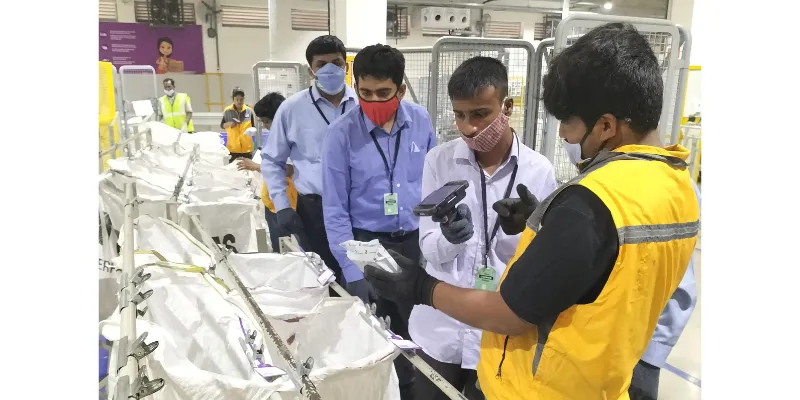
Young Adults of Sol’s ARC undergoing Internship Training
Sonali Saini, Founder - Sol’s ARC created a centre-based model where therapists work directly with children and young adults with special learning and psycho-social needs. After working with this model for a decade, she realised that these students need to be specifically prepared before they step into the outside world.
Sol’s ARC set out on a journey to understand the possibilities of vocational training and employment for persons with autism and intellectual challenges, not just for select students but at scale. The key focus was to create a replicable and scalable model. Sol’s Arc believes in creating large-scale systemic solutions that will help build a more inclusive ecosystem across the country. Their inclusive education solutions address the inequities faced by vulnerable populations to improve their learning and employment outcomes. The vision is to get every child educated and gainfully employed.
Understanding lived experiences for catalysing climate action
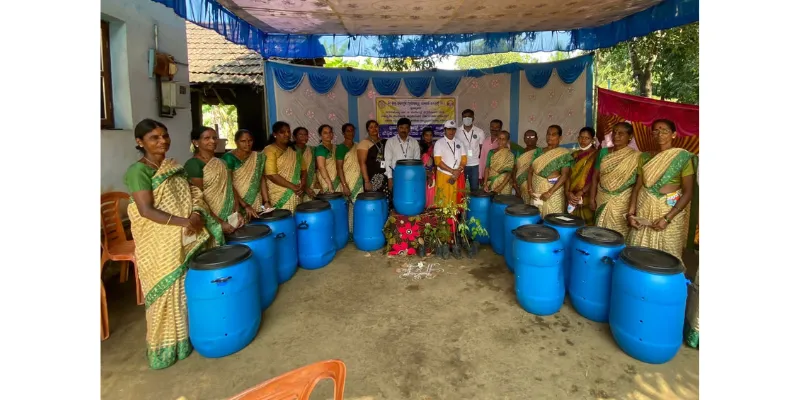
Training Session for Tip’s Women Force
For Divya Hedge, the founder of TIP Sessions, watching coastal communities grapple with floods in her hometown in Udupi, decreasing fish catches year after year, and negligible waste management tracking got her thinking about climate change. Fostering a strong sense of community-driven climate action started with training women to do waste management and earn income from these activities.
The mission of TIP Sessions, a grassroots organisation, is to leverage design, technology, linguistic, and regional context to achieve climate and gender justice. They are achieving this through a two-pronged approach to climate education and economic empowerment of rural women. The programmes are action-driven and local communities — particularly women and youth — are given a platform to voice their concerns.
Making climate action accessible and achievable for second and third tier cities can spark significant community-wide social change that is meaningful. With its expertise in human-centred design, TIP Sessions is uniquely positioned to utilise the benefits of design thinking to process local problems and craft solutions that are impactful.
These organisations are the second set of five incubatees out of a cohort of 10 non profit social enterprises currently undergoing incubation at The/Nudge Incubator — a programme acting as a catalyst for the non-profit sector by incubating social impact startups with the potential to solve for resilient livelihoods at scale. Capable and committed problem solvers are supported with an innovation grant, mentoring, and sector connects, while they solve some of the toughest livelihood problems faced by India’s underserved.
The 10 incubatees were selected from a pool of more than 450 applicants, after multiple rounds of interviews and business plan evaluations. While the programme runs for nine months, incubatees build connections and gain access to opportunities for three years post graduation. The/Nudge Incubator’s Cohort 9 is supported by Meta, Sabre, and Mphasis F1 Foundation.







